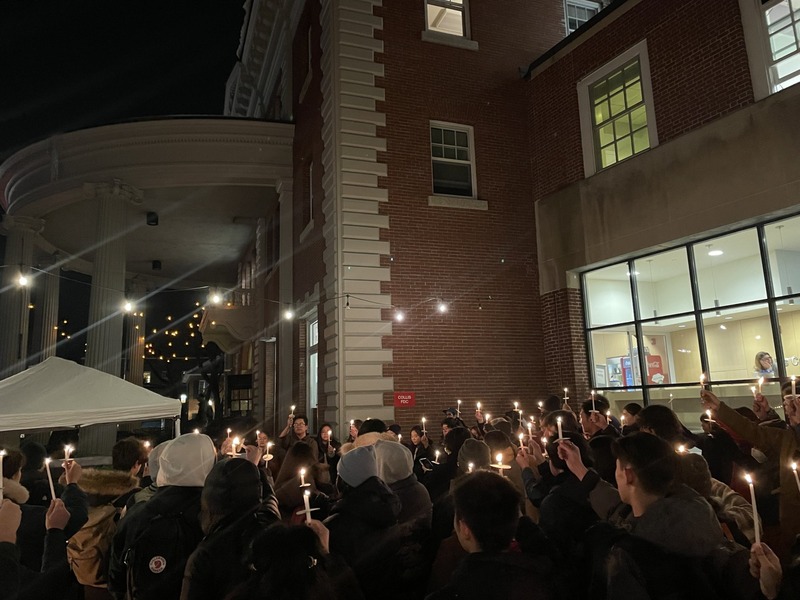The Dartmouth as an Asian-American Platform
The Dartmouth, America’s oldest college newspaper, is home to articles and editorials about everything from sports to campus culture. The February of 2002 saw a departure from the usual fare of articles about the chilly winter and instead, witnessed a spate of editorials about the institution of a potential Asian-American Studies Minor. One of the first of these articles, titled “Students Demand Asian American Studies,” included quotations from Morna Ha ‘04 and Derrick Chu ’04, members of the Asian American Task Force (AATF). The AATF, according to a 1999 email from AATF member Melissa Kho ‘99, was formed to encourage campus-wide “education and at times [working] closely with the Pan Asian Council towards increasing Asian-American resources on campus and promoting institutional change.” It seems that in the early 2000s, the institutional change sought by AATF was the establishment of an Asian-American studies minor.
"We're shooting to get a minor here, but that is a long-term goal. Right now, we're trying to facilitate the awareness of Asian American issues."
Derrick Chu '04, quoted in 2002 as a member of the Asian-American Task Force (AATF)
Although the goals of the AATF were relatively modest by modern standards, not all students agreed that Dartmouth needed an Asian-American Studies (AAS) minor, with some students writing editorials in The Dartmouth to voice their opposition. One student were particularly vocal in their opposition, writing several articles within the span of a few weeks, in which he articulated his reasoning for opposing the AAS minor. The above article hyperbolized and satirized the views of the AATF, writing, “if Asian -Americans -- who, according to the CIA World Factbook, constitute only 3.3 percent of the United States population -- want an ethnic studies program of their own, then I want my own pet program too. In fact, we should have ethnic studies program corresponding to every single ethnicity here at Dartmouth.” Naturally, this was not the intent of the AATF, but as the class of 2005 welcomed the largest number of Asian and Asian-American students in Dartmouth history at the time, the AATF felt it apt to call for an AAS minor. In response to the article above came an even greater number of articles in support of the AAS minor. Among these was an article written by Shirley Lin ‘02 entitled “Correcting a Few Assumptions,” in which she broadly addresses the arguments made by detractors of an AAS minor. She explains, "An AAS minor is crucial – Asian-Americans must continually confront the notion that they are perpetual foreigners rather than part of a long trajectory of experience in the United States.” Although the authors of the 2002 articles expressed a spectrum of views about the validity of an Asian American Studies minor, a common thread amongst all the articles was the expectation that an initiative would take time. “We understand that it’s going to take a while,” said Ha, “but Derek [Chu] and I are here to get the ball rolling.” A later article published in 2004 quoted Marie Choi ‘06, an intern for the Pan Asian Council and a leading advocate for the AAS minor, who expressed a similar sentiment. "The main response is that 'change takes time,'" Choi said. "As students, we understand the notion of progress, but we can not delay further action on the part of the administration and the deanery."
Two decades after these sentiments were shared about the extended timeline for an AAS minor, a 2021 article about the Dartmouth Asian American Studies Collective (DAASC) quoted DAASC member Maanasi Shyno ‘23 as saying, “We know it’s going to take time. But we’re adding to a movement. We’ve waited 25 years. We don’t know how to wait anymore.” DAASC, founded in Summer 2021 (and received COSO recognition in Fall 2022), has taken up the reins of advocating for an Asian-American studies program, working with students and faculty alike to build campus solidarity. In the wake of the Monterey Park and Half Moon Bay shootings on the weekend of the 2023 Lunar New year, DAASC organized a candlelight vigil to collectively grieve the victims, who were largely Asian and immigrant workers. Throughout the vigil, DAASC members and nearly a dozen other speakers read aloud remembrances released by the victims’ families. Vigil co-organizer and DAASC member Anh-Ton Nguyen ‘26 acknowledged the inherently political nature of the vigil: “It is political that an organization like DAASC has to organize this, and not the school administration.” As calls for the institutionalization of Asian American Studies at Dartmouth approach their 30th anniversary, the reverberations of the movement and its impact on the greater campus are preserved in institutional archives such as The Dartmouth. The immortalization of the AAS debate in The Dartmouth testifies to Asian American agencies past and present, highlighting the mark Asian American students have made on this campus.

